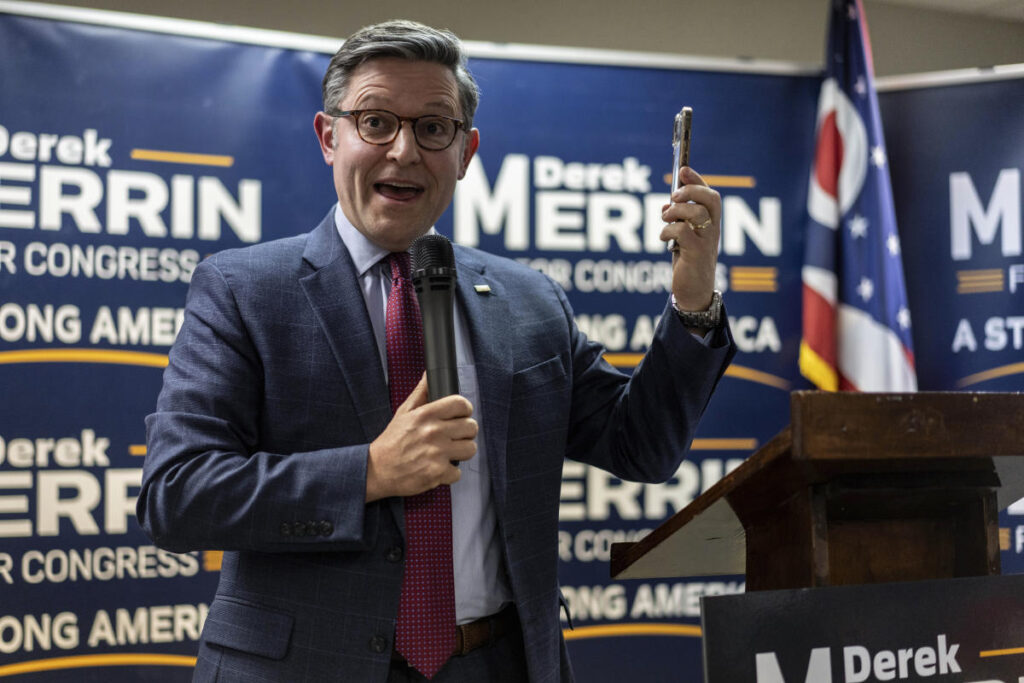House Speaker Mike Johnson recently stirred controversy during a campaign event by suggesting that Republicans might seek to repeal the bipartisan CHIPS and Science Act, legislation designed to boost U.S. semiconductor production. His initial remark came while he was supporting a vulnerable New York GOP congressman, amidst plans for a Micron semiconductor manufacturing plant in the area. Johnson, upon being questioned about the potential repeal, stated, “I expect that we probably will,” but quickly attempted to clarify that he actually intended to “streamline” the legislation instead. This contradiction highlights the challenges Johnson faces in balancing party orthodoxy, particularly in relation to Donald Trump’s position on government spending, with the interests of lawmakers in districts benefitting from the CHIPS Act.
Johnson’s comments drew immediate criticism from Democrats, who argued they reflected a broader conservative agenda aimed at dismantling successful government initiatives. The CHIPS Act has been credited by the White House with generating significant investments and creating hundreds of thousands of jobs. Vice President Kamala Harris has been vocal in promoting the act as evidence of the Democrats’ competency in handling economic issues, framing it as a success story that contrasts with the Republican approach. The act represented a significant investment of $54 billion into the semiconductor industry, vital for securing U.S. chip production in a competitive global market.
After facing backlash, Johnson retracted his earlier statement, asserting that repeal was not on the GOP agenda. Instead, he suggested that legislative efforts could focus on simplifying the CHIPS Act by removing certain regulations and requirements linked to environmental initiatives. This incident underscores Johnson’s ongoing struggle to navigate the intricacies of his leadership position while aligning with both Trump and the needs of vulnerable Republican members in challenging electoral contexts. His effort to distance himself from previous comments about bold regulatory reforms reflects a cautious approach to policy that may alienate some party members.
The backdrop of Johnson’s remarks includes Rep. Brandon Williams, the Republican he was campaigning for, who supports the CHIPS Act and has a personal career history in the tech sector. Williams revealed that after Johnson’s controversial statement, the Speaker expressed regret and claimed to have misunderstood the question. Johnson’s comments came at a time when New York’s economy is closely tied to the anticipated job growth from the Micron plant, which itself was aided by substantial federal funding through the CHIPS Act.
Democratic leaders were quick to leverage Johnson’s remarks for political gain, positioning the potential repeal of the CHIPS Act as a threat to economic stability and job creation in regions dependent on manufacturing. New York Gov. Kathy Hochul highlighted the high-stakes nature of the act, emphasizing that any repeal efforts would jeopardize over 50,000 jobs and over $231 billion in economic growth. This narrative fits into a broader Democratic strategy aimed at appealing to working-class voters, underscoring the party’s commitment to revitalizing American manufacturing.
In a commentary on Johnson’s statements, Democratic officials have criticized him for seemingly promising to destroy jobs rather than create them. The discourse around the CHIPS and Science Act has become increasingly pivotal, with arguments framed not only around its economic impact but also around partisan governance. The Commerce Department’s report, showing that the act has enabled over $30 billion in funding for projects aimed at creating more than 115,000 jobs across various states, serves as key evidence in the Democrats’ campaign narrative. Overall, the unfolding situation highlights the ongoing tensions within the Republican party while reinforcing the Democrats’ focus on economic issues as they prepare for the upcoming election cycle.

